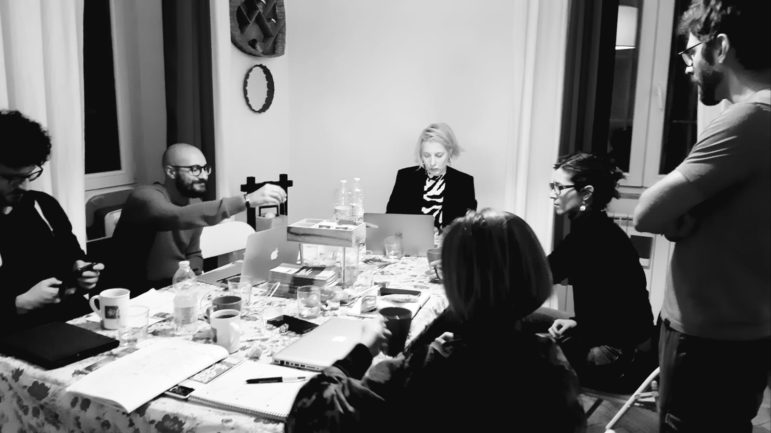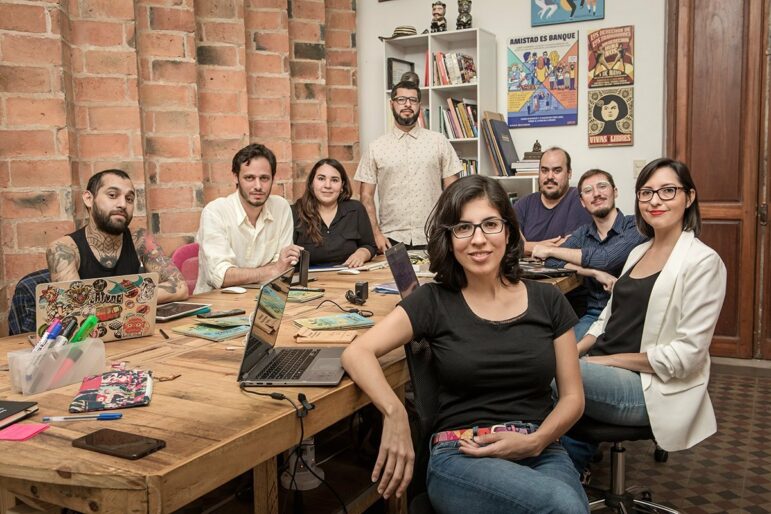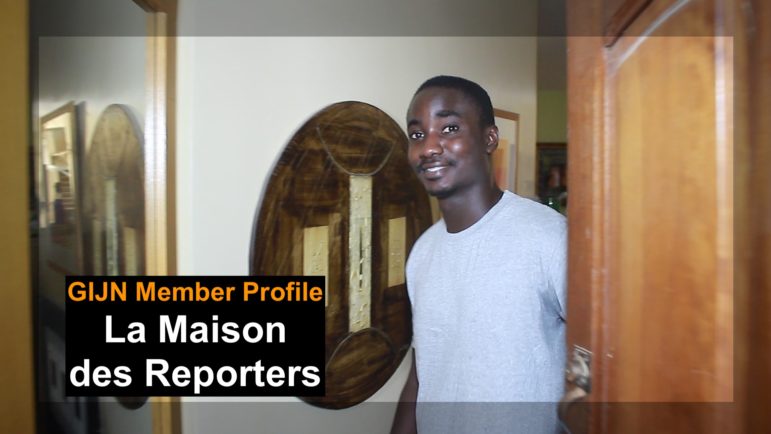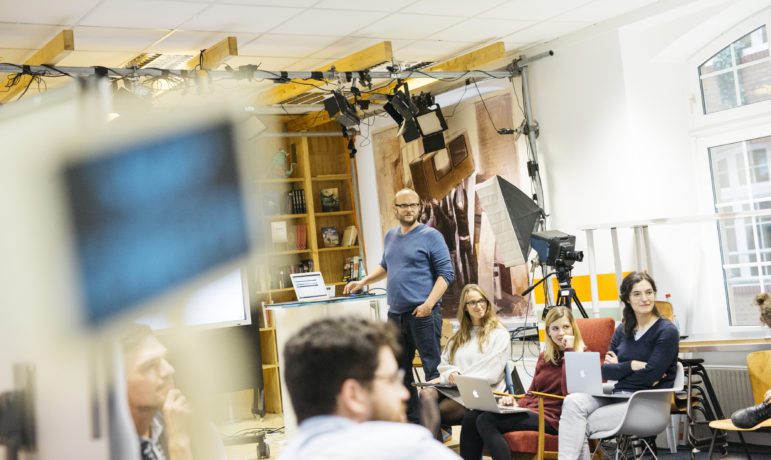

How Italian Investigative Journalists Are Taking on International Mafias (While Trying Not to Go Broke)

Investigative Reporting Project Italy meeting in Rome, November 2019. From bottom left: Lorenzo Bagnoli (IRPI), Luca Rinaldi (IRPI), Gordana Miladinovic (OCCRP), Alessia Cerantola (IRPI), Alessandra Gerbo (IRPI), Giulio Rubino (IRPI).
Italy’s first center for investigative reporting was created with very few resources, after a small group of people at the start of their careers met almost by accident in a foreign land.
The Investigative Reporting Project Italy (IRPI) was launched in 2012, months after a handful of Italian journalists crossed paths at the Global Investigative Journalism Conference in Kyiv, Ukraine. “No major Italian media had sent any of their staffers,” recalled Cecilia Anesi, IRPI’s 32-year-old co-founder and current president. “The participants included Al Jazeera, BBC, and The Guardian, while we were all — with the exception of one experienced journalist — young freelancers.”
After meeting leading investigative journalists from all over the world at the conference, Anesi and her colleagues came back with an idea: to create an Italian center for investigative journalism, whose reporters would pool their time and energy to pursue long-term probes into matters of public interest — in line with similar projects that had been launched in other countries.
IRPI was started with zero capital, but since then it has grown to become a well-established player in the Italian media landscape. It has a dozen members — five of whom are on the editorial board — who work full- or part-time with the association. It has published dozens of articles in a variety of news media in Italy and beyond: from The Guardian and The Sydney Morning Herald to the South China Morning Post, and many more.
IRPI focuses on topics such as organized crime, political and corporate corruption, and misuse of public funds, with a preference for stories whose ramifications reach beyond Italy’s borders. This international approach is made possible through collaboration with a solid network of foreign investigative journalists. This not only makes IRPI’s work more appealing to the global news market, but reflects the very nature of mafia organizations today, Anesi said: “They are a globalized reality. It would make no sense to limit our scope to a single country.”
A Challenging Environment
Despite their prolific publication in numerous countries, IRPI’s financial situation is far from rock-solid. “Convincing the Italian media to publish us has always been very difficult,” said Anesi. Even when they accept stories, the price that media outlets are willing to pay for an investigation is by no means enough to even cover the journalists’ costs.
Around 80% of IRPI’s roughly €140,000 (about $155,215) annual budget comes from a multitude of journalism grants and foundations, almost none of which are Italian. “In this country, the culture of private philanthropy to fund independent journalism is absolutely non-existent. We are forced to convince foreign donors,” said Anesi.
Financial hardship is a serious problem for Italy’s news outlets, often taking a toll on the quality of their work. According to Pierluigi Allotti of Askanews news agency, the author of several books on Italian journalism, the country’s investigative reporting was in far better shape in the decades that immediately followed World War II.
Italian journalism peaked in the 1970s – the so-called “Years of Lead” – when Italy was ravaged by frequent attacks by both neo-fascist and far-left terrorist groups, according to Allotti. Journalists regularly shed light on the violence, despite the authorities’ efforts to conceal the truth. “That golden age, however, has now faded away due to the sector’s general crisis,” said Allotti — a crisis largely caused by the advent of the internet.
Adapting to the digital era has been a challenge for news organizations worldwide, but in Italy these challenges have further dried up resources in a media market that was traditionally weaker than other Western countries. Journalists end up working for very low salaries, sometimes even for free. (In early December, a contributor for the largest Italian newspaper, Corriere della Sera, made headlines when she resigned after learning that her pay had been cut to 15 euros per article — before tax.)
These financial hardships can weaken Italian reporters’ watchdog role, by making them more vulnerable to manipulation and control by editors or politicians. “An underpaid journalist is a journalist who’s not free,” Allotti said.
Reporting from the Mafia’s Homeland
Funding isn’t the only problem Italian investigative journalists have to grapple with: their personal safety is sometimes at stake. Italy currently ranks 43rd out of 180 on the Reporters Without Borders’ World Press Freedom Index, behind all other major democracies in Western Europe. Among the main issues highlighted by the watchdog are intimidation from politicians and criminals, with some 20 journalists currently under around-the-clock police protection because of “serious threats or murder attempts by the mafia or by extremist groups.”
Anesi is very aware of the risks in Italy, but stresses that organized crime reporting brings even wider dangers. As the criminal organizations they are reporting on have spread their tentacles well beyond Italy’s borders, “one shouldn’t feel safe in Germany either, nor in the Netherlands, in Slovakia, or in the United Kingdom,” she said. “This has become a transnational issue.”

IRPI journalists working on their podcast with Stitcher at Padua Courthouse, May 2019. Left to right: Giulio Rubino and Alessia Cerantola (IRPI) and Dan Bloom (Stitcher).
The last few years have been particularly worrisome for journalist safety in Europe, with the murders of Maltese journalist Daphne Caruana Galizia in 2017 and Slovak reporter Ján Kuciak and his fiancee in 2018. IRPI’s journalists, along with dozens of their colleagues all over the world, reacted swiftly. Among the IRPI investigations that Anesi is most proud of are those carried out as part of international efforts to continue the two slain reporters’ work.
In Malta, IRPI and its reporting partners have focused on the local mafia and its involvement in diesel and drug trafficking, and its ties with the Italian mob. Meanwhile, at the time of Kuciak’s death, IRPI was helping him research the ramifications of the ‘Ndrangheta — one of the world’s most feared cartels, which originally came from the southern Italian region of Calabria — in Slovakia. After his murder, IRPI joined “Unfinished Lives, Unfinished Justice,” a project that publishes new findings based on Kuciak’s investigations.
IRPI journalists have received some threats, but their main experience is of a different, more subtle form of intimidation: defamation lawsuits from people caught up in their probes. These are often deliberate attempts to discourage in-depth reporting, Anesi said. According to Italian watchdog group Ossigeno per l’Informazione (Oxygen for Information), libel lawsuits targeting Italian journalists doubled between 2011 and 2017. At least 70% of the suits were dismissed without reaching trial.
IRPI provides legal backing for its journalists when they are sued, but “for journalists working by themselves, without any support from some kind of organization, lawsuits can be very frightening,” Anesi said. Further, media outlets sometimes prefer to play it safe, she said, rejecting a pitch when it looks like the article may stir up trouble.
Big Plans Ahead
Despite this challenging environment, IRPI’s team has big plans for the weeks to come. It is currently preparing for a major organizational transformation and website redesign, expected to be implemented this spring. What is now technically an association will become an official, registered news outlet entirely focused on investigative journalism. “This is new, there’s no such thing in Italy yet,” said Giulio Rubino, another IRPI co-founder. In its new form, IRPI will be legally allowed to publish its work in full on its own website; currently most pages only include an introduction and a link to the outlet that bought the article.
This means that IRPI will no longer have to depend on other media outlets’ willingness to provide a platform for its stories: “We will have the freedom to publish whenever and however we see fit,” Anesi points out. The team will also be able to build up its own readership and boost their resources with a planned membership program, which will include exclusive access to special content and live events.
IRPI also plans to adopt more of a multimedia approach to reach new audiences, both domestically and internationally. “We wish to explore and experiment with as many media formats as possible,” the 39-year-old Rubino said. The most notable example is “Verified,” a brand new podcast in English that they have produced with the US company Stitcher. The 10-episode series tells the story of an Italian police officer accused of using the host-a-traveller website CouchSurfing to lure numerous women into his apartment, drug them, and sexually assault them.
The story was at the center of an important IRPI investigation back in 2015 that seemed particularly suitable to the format. According to Rubino, it was picked due to its strong (albeit tragic) human angle, the variety of voices and characters, and the fact that the story was still developing, as the trial is ongoing.
The IRPI team had long been attracted to podcasting, but only had limited technical skills in this field. Collaborating with Stitcher, who last year sent a producer to Italy to work on the new project, has been hugely rewarding: “We have discovered a whole new world, with the help of experienced professionals,” said Rubino. “It’s been exciting.”
This is just the start, with more ideas for podcasts in Italian in the pipeline. “We like the intimacy of the audio format,” continued Rubino, pointing out that when it comes to podcasting, Italy is still “a relatively untouched market.” Rubino and his IRPI colleagues want to help change that: “I hope that we will be innovative,” he said. Being an investigative journalist in Italy isn’t easy, but these reporters are thinking big nonetheless.
 Michele Barbero is an Italian journalist based in Paris. After several years at France 24, he currently works as a producer for French news agency AFP and contributes to various magazines in Italy and abroad.
Michele Barbero is an Italian journalist based in Paris. After several years at France 24, he currently works as a producer for French news agency AFP and contributes to various magazines in Italy and abroad.









